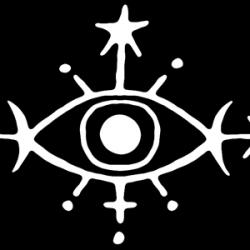The Snake's Fragmented Claim
This claim of independent "otherness" is exactly the claim the Snake used to entice Adam and Eve to sin in the Garden of Eden. The Snake claimed that God did not want them to eat from the Tree of Knowledge of Good and Evil since by eating from the tree they would become as knowledgeable and powerful as God Himself. The Snake set up a paradigm by which Adam was no longer a projection of God here in this world of concealment and choice, i.e., God's clothing. Rather, the Snake got Adam and Eve to fall into a false perception—that there is God and there is them, and that it is not really all aspects of the One Infinite God. And so, immediately after Adam sins, he views himself (the clothes) as naked (an independent essence) rather than a projective expression of the One Infinite God, and then he runs to put on clothes of his own.
Perhaps this is why one of the words for clothing in Hebrew, beged, has the same root as the Hebrew word for rebellion, boged. The original rebellion against the Oneness of God in this world can be seen in the clothes (Adam and Eve) thinking they are an independent entity and need clothes of their own.
Disclaimer
Now, we are not suggesting here that we all take off our clothes and live in nudist colonies. Given the present identity crisis caused by the sin in the Garden of Eden, clothes are a necessary evil in restoring the human being's perspective in the fact that he is an aspect of the Divine, rather than falling to a complete identity with the body. And this is, perhaps, why Adam runs to acquire clothes after the sin. While he has fallen from his previous clarity that he is a Divine aspect, he has not fallen to the point where he does not know he has a Divine aspect within him altogether.
That is to say, when we wake up in the morning and take a look in the mirror, our intuition is to identify with the body though we may contemplate having a soul. However, this perspective is backward. Before the sin, were Adam to look in the mirror, his intuition would have been to identify with the soul and contemplate having a body. For Adam, the body did not need clothes to insure his dignity. For Adam, the body was not him; the body was a possession. The body was the clothes.
(Interestingly, the Jewish mourner is to rip into his clothes, as opposed to ripping into one's self [which was a prevalent custom of other societies] implying that, in death, it is only the clothes of the self [i.e., the body] that have been ripped away, and the not self itself [i.e., the soul], which goes on.)
But, given our present identity crisis post-sin-in-the-Garden-of-Eden, the role of clothes is now as a testimony, constant reminder, and reflection of the fact that the human being is more than an animal; more than a mere random conglomeration of molecules; that the human being is not just a body. The statement of the nudist colony in the post-sin reality is, 'what you see is what you get'—this body is what I am. 'The animal walks around this way, why not me?' 'It's natural.' This is exactly the perspective that wearing clothes is coming to refute. Wearing clothes is coming to say that there is infinitely more to the human being than his or her physical nature. Clothes, and modest conduct in general, are for the purpose of restoring the Divine dignity of the human being.





